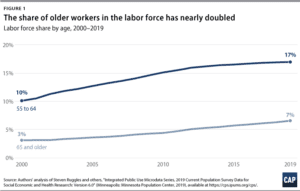Stop Overlooking (The Most) Highly Qualified Job Candidates!
rw-admin | 08/09/2019

I’m talking about the, “more experienced, more seasoned, more mature.” Yes, the over 50 crowd! Age discrimination is not a new issue and it impacts nearly every aspect of life in the United States unfortunately, but in the current job market, it is mind boggling why companies are still refusing to give older Americans a fair shake when recruiting and interviewing for open positions. We all know it is illegal to blatantly age discriminate, but nevertheless, it happens. As we are well into the “Crisis for Talent,” and organizations are severely struggling to find candidates (and literally failing) it is time for a call to action; Stop Overlooking These Highly Qualified Job Candidates!
So, what’s the problem? Why are organizations dismissing older candidates?
- They view them as high-risk because they think they will be retiring soon.
- Possibly, however, The U.S. Bureau of Labor Statistics (BLS) Employment Situation Summary for the month of July, found that older workers are more likely to be in the workforce today than ever before. People are living longer; on average, about seven years longer than the previous generation and with that means they are working longer. As a matter of fact, there are currently more than 10 million people above age 65 in the labor force, up from just more than 4 million in 2000. This graph shows that 24% of the current workforce are 55+! So why are companies ignoring nearly ¼ of the current pool of candidates?

- They assume they will be way too expensive on compensation.
- This may be the case, but maybe not. If you present an opportunity to someone who has 5 years of experience versus 25 years of experience, there is going to be a compensation difference between the candidates, naturally. But you wouldn’t do that, would you? Paying market value for a position should have no bearing on an employee’s age. An inexperienced candidate will not have the same target compensation as one highly experienced. Therefore, depending on the role, and what a company is seeking in an employee, they really should not be interviewing both ends of the spectrum, so the salary debate is a moot point.
- They expect older individuals cost too much in healthcare.
- This is an antiquated excuse. In fact, younger employees are actually the most expensive (in most cases) because they have children to cover whereas older employees do not. And taking it a step further, if an employee is over age 65, they are covered by Medicare and don’t even need the basic healthcare most employers offer.
- They fear older candidates may find it challenging to adapt to a new environment or technology. OR concerned that they may be to “set in their ways” to learn new things or take instruction.
- Say what!?! This makes the least sense of all. These workers have been on this planet adapting to change twice, maybe three times as long as the youngest employees. “Adapt or Die” is reality and let’s face it, Baby Boomers have the most experience in doing just that. They did not get to their current place in life by not being able to take instruction. That is not a characteristic of this generation.
- The recent article Hiring for Diversity: 6 Reasons Baby Boomers are Great for Business states perfectly, “While millennials are usually more knowledgeable about the newest technologies, baby boomers have had to learn and adapt to different technologies – and completely different ways of doing things as a result – multiple times throughout their careers. That experience gives them a certain adaptability and resilience that millennials have yet to acquire. Many baby boomers have reinvented themselves in the workplace and can provide a wealth of information about how people adapt to new technologies and systems because they’ve been there.”
There are other discriminatory reasons companies avoid interviewing and hiring older candidates but those listed above tend to be the main issues.
Now let’s move on to what these candidates bring to the table and why organizations need to give them a chance. All of these areas are a direct result of time and experience; characteristics that improve a work environment and should not be taken for granted or overlooked.
- They are excellent mentors.
- They have highly developed soft skills cultivated through decades of face-to-face communication.
- They generally require less training and time to ramp-up.
- They tend to be more loyal, staying with a company longer, and reliable.
- They are more resilient.
- They have excellent time management skills.
- They have a well-established network of business contacts.
- They provide a great add to the company culture.
- They understand how business works.
- They have ideas and creativity.
- They have a wealth of market/ industry “know how.”
- They have a strong work ethic.
- They are goal oriented and take pride in a job well done.
There is a strong case supporting the notion that the most effective, successful teams, are diverse and that includes age diversity. Plus, keep in mind a diverse environment tends to foster a more inclusive, positive company culture which in this time of “crisis for talent,” goes a long way in employee retention. And, last but not least, keep in mind that ¼ of the current workforce make up this space (age-bracket), so why in the world would companies not look to them as strong, viable contenders to fill open positions? It’s time to reevaluate outdated opinions on this subject. The top talent you are seeking could very well be within in this highly qualified group of individuals.
Written By: Angie Barnes, The Q Works Group
